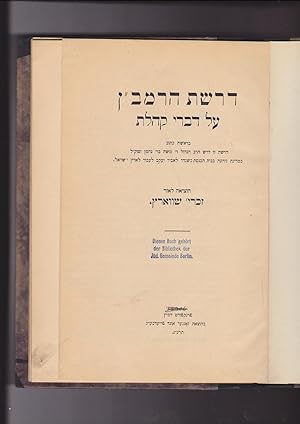Descripción
In Hebrew. 30 pages. 9.5 x 6.5 inches. Ex libris of the pre World War II Bibliothek der Jud. Gemeinde Berlin. Ramban (Rabbi Moses ben Nachman Gerondi -Nachmanides") 4954-5029; 1195-1270 is known by the acronym RaMBaN, and to the non-Jewish world-as Nachmanides. He was called Gerondi after his native town Gerona, Spain, where he was born. He was born of a noble family, which included many prominent Talmudists. He displayed great talent at a very early age, and his scholarship, piety and very fine character made him famous far beyond his own community. At the age of 16 he had mastered the whole Talmud with all its commentaries, and at that early age wrote a defense (Milchamoth Hasheim) of the work of the great codifier and Talmudist, Rabbi Isaac Alfasi, against the attacks of Zerachiah Halevi, author of "Sefer Hamaor." Not wishing to make any profit from the Torah, the Ramban became a practicing physician in his native town. However, he was the communal rabbi of Gerona at the same time, and later became the chief rabbi of the entire province of Catalonia. For many years the Ramban lived in his native town, supporting himself as a physician, and devoting most of his time to the study of the Talmud and Kabalah, and to his literary work, writing commentaries on the Talmud. But in his declining days, when he was nearly seventy years old, his quiet life underwent a sudden change. An apostate Jew, Paulus Christians, had challenged the Jews to a religious disputation. He induced king James I of Aragon to summon the renowned Rabbi of Gerona to a public debate in Barcelona. Reluctantly, the Ramban journeyed to the king's court at Barcelona. The Ramban declared himself ready to participate in the debate only if he were given permission for full freedom of speech. This the king granted him. Then, before a large court audience, began the debate between Paulus and his Dominican colleagues on the one side, and the venerable Rabbi of Gerona at the head of the Jewish representatives, on the other. The Ramban easily refuted all the arguments of Paulus, and proved effectively that the Jews were entitled to retain their own beliefs and faith. For four days the public disputation was carried on, and the Ramban's brilliant defense of his faith was too much for his adversaries. It made them anxious to end the debate. The king was so impressed with the scholarship, wisdom and eloquence of the Ramban, that he visited him in the synagogue the following Shabbos. At a farewell audience to which the King invited the Ramban, the king praised him highly, and gave him a rich present as a token of respect and admiration. As in the case of the disputation of Rabbi Jehiel of Paris, the enemies of Israel claimed the victory in the debate, spreading malicious propaganda throughout Spain. Indignantly the Ramban published a true account of the debate, and even had it ratified by the king himself. But although he did not publish anything except what he had said at the debate with the king's permission, the Ramban was brought to trial by the influential Dominicans, and was eventually condemned to banishment for "blasphemy." At the age of 72, the Ramban had to leave his beloved community, his famous Yeshivah, his friends, and his native land. He set out for the Land of Israel, hoping to find peace and solace there. Unfortunately, he found the Holy Land in great desolation; the Jewish communities were scattered; poor and ignorant of Jewish knowledge. The Ramban began a campaign to improve the position of his brethren in the Holy Land, both spiritually and materially. He reorganized the communities, set up schools, rebuilt the synagogues, gave public lectures and discourses. Here he wrote his famous commentary on the Torah, and other works. The Ramban died at the age of 75,and was buried at Haifa, near the grave of Rabbi Jehiel of Paris, whose life so resembled his own. N° de ref. del artículo 005354
Contactar al vendedor
Denunciar este artículo
![]()



